by pmdavis | Nov 21, 2023
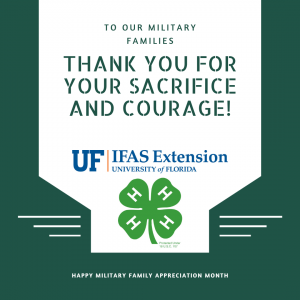
We love our Military Families!
November is a month many of us celebrate our families and have traditions we enjoy annually. November is also designated as the National Military Family Appreciation Month. For our military families it is a time when the country recognizes the nearly 5.2 million service members and their families. UF/IFAS Extension and 4-H are proud to be a part of the military family working with youth centers across the nation to have some consistency for military kids. 4-H works will military programs worldwide to support our military youth at bases and in local communities. We recognize that our military youth must cope with many circumstances while their parent or sibling is working often away from home. Causing a hole created by the absences during many life events. Military life imposes unique demands on the family, from a change in family structure to the stress of someone missing from events, to the worries of a family member being hurt while working.
Since many of us have a little extra time during the holidays there are several things you can do to show your support of our military members and their families. We as non military families celebrate with each other at family/friend gatherings etc. and sometimes forget that our military friends are away from home and missing these traditions. We can help celebrate, recognize, acknowledge, and show gratitude for those sacrifices our military family’s make so each of us can enjoy freedom by sharing our love.
You can do simple things to demonstrate your appreciation and gratitude for their sacrifice, resiliency, and courage.
Show your support by:
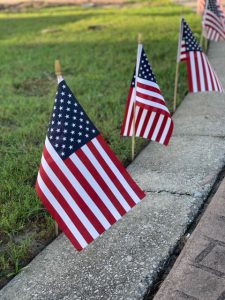
Celebrate our Freedom and express your appreciation to military families!
- Expressing Gratitude and appreciation: You can take a moment to thank military families for their sacrifices and service to the nation. You can send cards, write letters, if you do not know anyone here is a local organization that can help get them to the troops. December 1 is the deadline for Holiday themed cards to go out. You can give shout outs on social media using the hashtag #MilitaryFamilyAppreciation
- Sending care packages to veterans and military families overseas or donate to to Military Support Organizations.
- Giving the gift of time by: visiting a local veteran, spending time with a military family, or volunteering at a veterans organization (contact your local VFW, American Legion, VA hospital or veteran’s shelter).
- If you know a military family, open your doors to share the holidays with you by offering help with tasks like childcare, home maintenance, or meal preparation.
- You can also show your support by participating in community events and initiatives that celebrate and support military families in your area.
I hope you will join Florida 4-H #Florida4H and our Nation #MilitaryFamilyAppreciation to celebrate Military Family Month, by doing simple things to demonstrate your appreciation and gratitude to our military members and their families! Have a wonderful Thanksgiving.
by Claire Davis | Sep 28, 2023
Now that school is back in full swing for our kids, it can be hard to make sure they are eating nutritious foods at each meal. I know that I fall short when I make meal and snack choices, imagine how difficult it is for a kid. Follow along below to learn more about why it is important to make healthy choices, as well as how to teach youth to make healthy breakfasts and afterschool snack choices!

Strawberries, blueberries, cereal grains, and a banana. Fragaria, fruits, foods, red, sweets, healthy eating. UF/IFAS Photo: Tyler Jones.
Why should I make healthy choices?
That is a great question! As a busy mom of two, I am always trying to balance work, school, family, and our social calendar. Healthy eating is essential for everyone. Your eating habits can contribute to physical movement, sleep, health, energy levels, and education. I can tell a large, postivie difference in my overall attitude, energy levels, and sleep when I am making better choices. Have you ever heard the saying, “Breakfast is the most important meal of the day”? After a long night’s sleep, we have to break our fast from food, which in turn boosts our energy levels. For our children, it has been determined by the CDC that “Healthy students are better learners. Research shows that eating habits and healthy behaviors are connected to academic achievement. Student participation in the School Breakfast Program is associated with better grades and standardized test scores, reduced absences, and improved memory” (3). By starting off the day with a good breakfast, youth perform better in school. If a healthy breakfast can make a big difference, then healthy food options at other meals or snacks should make a huge impact.

Keywords: folic acid rich foods, food, healthy, metabolism. (UF/IFAS photo by: Josh Wickham)
When you say healthy choices, what does that mean?
This does not mean that you must diet every single day. This does not mean that you cannot have the cookies or ice cream. Busy people don’t have a lot of time to prepare and eat healthy meals. It can be helpful to have a quick list of ideas to maintain healthy eating. It is important for you to balance your meals. Consider choosing at least eating 3 of the following serving sizes every day: dairy, fruit, grains, healthy fats, proteins, or vegetables. It is also important to cut down on foods that are high in fat or added sugar. Foods in moderation are okay, but try to not overindulge on the pizza, sodas, or desserts. On top of eating from different food groups, cutting down on fats or sugars, remember to drink lots of water.

Case of bottled water. Photo taken 08-06-20.
Your body is unable to continue functioning properly without fluids. Staying hydrated may seem like a difficult task, but it is extremely important for us to stay hydrated for optimal health and performance throughout the day. “Drinking enough water each day is crucial for many reasons: to regulate body temperature, keep joints lubricated, prevent infections, deliver nutrients to cells, and keep organs functioning properly. Being well hydrated also improves sleep quality, cognition, and mood.” (1) staying hydrated, we can seriously harm ourselves. Whether you are considered youth or an adult, you can still lose approximately 40 percent (2) of your body’s water during hard work or exercise.
How do I help my youth make better food choices?
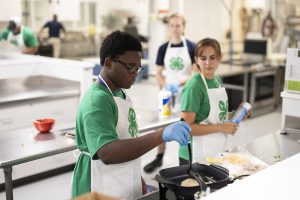
4H youth participating in a cooking workshop at 4H University. Photo taken 07-26-22.
The earlier that we introduce wholesome, nutritious choices into our youth’s diet, the easier it is for them to make healthy choices. Many of our habits start in the home and you are the prime role model. I have found that if I show that I am willing to try a food, my child will also be willing to try it. Whereas, if I turn my nose up at a food, my child tends to think that they will also not enjoy that food.
Kids who enjoy breakfast every day have better memories, more stable moods, higher energy, and score higher on tests. Breakfast does not have to be a difficult meal to make healthy. Eating a breakfast high in quality protein—from enriched cereal, yogurt, milk, cheese, eggs, meat, or fish— is a great place to start.
Some high protein breakfast ideas:
- Boil eggs at the beginning of the week and offer them with a low-sugar, high-protein cereal, and an apple to go.
- Make breakfast burritos filled with scrambled eggs, cheese, chicken, or beef on a Sunday and freeze them.
- An egg sandwich, a cup of Greek yogurt or cottage cheese with fruit, and peanut butter on wholegrain toast can all be eaten on the way to school.
If I keep junk food in the house, I tend to eat it. I always make a point to keep healthy snack options in the house available, rather than boxes of junk food. Healthy snack options at home include fruits, vegetables, and healthier beverages. Soda is high in sugar, so to help cut the sugar, I keep water, milk, and pure fruit juice in the fridge. It is easy for me to make those choices since I am the adult that goes grocery shopping. Try including your child when making snacks to let them make good choices too!
Ideas for healthier alternatives:
- Instead of French fries, try baked fries from the oven and lightly salted.
- Instead of ice cream, try Greek yogurt, sorbet, or a fruit smoothie.
- Instead of fried chicken, try baked or grilled chicken.
- Instead of doughnuts or pastries, try bagels or English muffins.
- Instead of homemade cookies, try graham crackers, vanilla wafers, or fruit and fruit dip.
- Instead of potato chips, try baked vegetables chips or nuts.
- Craving something crunchy? Try carrots or celery.
- Craving something sweet? Try vanilla Greek yogurt with some fresh fruit.
- Craving something salty? Try popcorn or edamame.
Sources:
- https://www.hsph.harvard.edu/news/hsph-in-the-news/the-importance-of-hydration/
- https://www.scripps.org/news_items/6630-6-simple-ways-to-stay-hydrated
- https://www.cdc.gov/healthyschools/features/eating_healthier.htm#:~:text=Healthy%20students%20are%20better%20learners,reduced%20absences%2C%20and%20improved%20memory.
- https://www.helpguide.org/articles/healthy-eating/healthy-food-for-kids.htm
- https://www.purdueglobal.edu/blog/student-life/healthy-food-options-college-students/
by Prudence Caskey | Aug 31, 2023
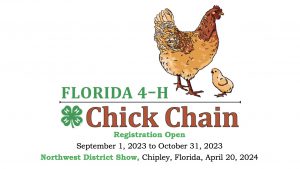
Who can participate in the NW District Chick Chain Project?
4-H Youth ages 5-18 from the Northwest District of Florida can enroll and participate in the NW Florida 4-H Chick Chain project. Those counties include Bay, Calhoun, Escambia, Franklin, Gadsden, Gulf, Holmes, Jackson, Jefferson, Leon, Liberty, Okaloosa, Santa Rosa, Wakulla, Walton, and Washington.
What is the Chick Chain project?
Join 4-Hers from our 16-county Northwest Extension district and learn how to raise and care for chickens. At the end of the project, there’s a district show where you’ll show off your birds and everything you’ve learned. This website will support you throughout your project. (more…)

by lauenc | Jul 6, 2023
In today’s fast-paced digital age, it’s essential for young minds to engage in activities that foster creativity, practical skills, and personal growth. Summer day camps with 4-H provide an excellent opportunity for youth to explore their interests and develop new talents while having “sew” much fun! Thanks to the Florida 4-H Foundation’s Clothing, Textiles, and Fashion Mini Grant, supported by JOANN Fabric and Craft, Holmes County 4-H Sewing Summer Day Camp was made possible. In this post, you will discover the enriching experiences and valuable lessons that 4-H members gained while immersing themselves in the world of sewing, textiles, and fashion.
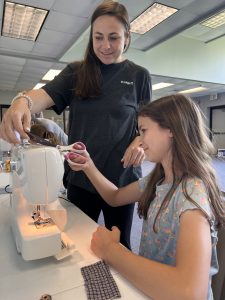
Nurturing Creativity:
At the heart of the sewing summer day camp lies the spirit of creativity. Through hands-on projects and guided instruction, participants discovered the joy of transforming fabrics into unique and stylish creations. From selecting patterns and colors to sewing intricate details, campers were encouraged to let their imagination soar. The camp provided a safe and supportive environment for young minds to explore their creativity, leading to the development of innovative designs and personal style.
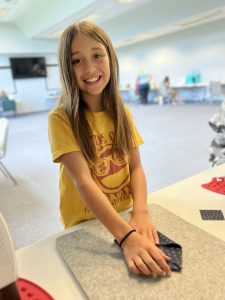
Building Practical Skills:
Sewing is a practical skill that cultivates patience, precision, and problem-solving abilities. Throughout the camp, youth were introduced to the fundamentals of sewing, including understanding different fabrics, operating sewing machines, and mastering essential stitching techniques. Under the guidance of experienced instructors, participants progressively honed their skills, learning how to read patterns, measure and cut fabric, and assemble garments with finesse. These newfound skills empowered the youth to embark on independent sewing projects beyond the camp.
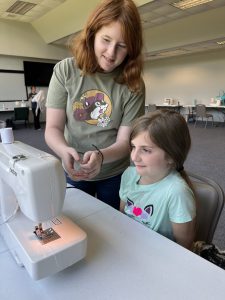
Fostering Teamwork and Collaboration:
The sewing summer day camp fostered an environment of teamwork and collaboration, where participants worked together to complete various sewing projects. Whether assisting each other with challenging stitching or providing creative input during design discussions, campers learned the value of cooperation and the power of collective effort. Through these interactions, they discovered that the world of sewing extends beyond individual endeavors and that sharing knowledge and skills can enhance everyone’s experience.
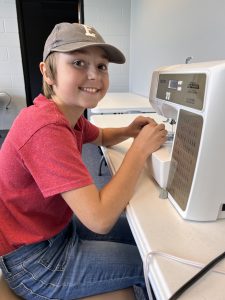
Cultivating Attention to Detail:
Precision and attention to detail are crucial aspects of sewing. Throughout the camp, participants were encouraged to carefully measure, cut, and sew fabrics to achieve flawless results. They learned the importance of meticulous planning, double-checking measurements, and maintaining focus throughout the sewing process. Cultivating this attention to detail not only improved their sewing outcomes but also instilled in them a valuable life skill applicable in various contexts.
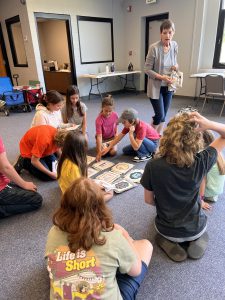
Navigating Fashion Trends and Sustainability:
Through engaging discussions and interactive sessions, campers explored the concepts of fashion, upcycling, and sustainable fabric choices. They gained an understanding of the environmental impact of fast fashion and discovered how they can make a positive difference by embracing sustainable practices in their own sewing projects and daily lives.
The Holmes County 4-H Sewing Summer Day Camp, made possible by the Florida 4-H Foundation’s Clothing, Textiles, and Fashion Mini Grant supported by JOANN Fabric and Craft, offered an incredible opportunity for youth to explore the world of sewing, textiles, and fashion. Participants not only developed practical sewing skills, but also nurtured their creativity, fostered teamwork, honed attention to detail, and gained insights into sustainable fashion practices. Through this enriching experience, 4-H youth were empowered to express their individuality, explore their passions, and embark on a lifelong journey of creativity and self-discovery.
For more information about upcoming youth programming related to sewing, textiles, and fashion with Holmes County 4-H, visit the UF IFAS Extension Holmes County 4-H Facebook page or contact the Holmes County 4-H Agent at 850-547-1108.
To learn more about how JOANN can support 4-H programming in your county, visit 4-H | JOANN Discount Program.
#JOANNLOVES4H
@Florida4H

by aschortinghouse | May 13, 2022
Horse Show
Youth from across north Florida gathered to compete at the 2022 Area
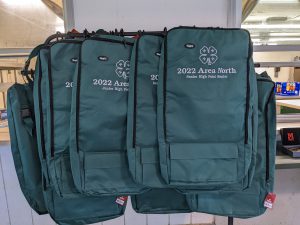
2022 Area North High Point Division Winners bridle bags.
North Horse Show in Clay County. Area shows take place throughout the state and serve as a qualifying show for the state show which takes place this summer. This is not just another horse show though, these 4-H Area shows are unique in that these shows are just one part of the larger project these youth are involved in. At the beginning of each year, youth declare which horses they will be working with. They are then responsible for working with their horses to learn more about equine sciences and to prepare for the various show and project opportunities such as workshops and shows. At the 2022 Area show, youth had the opportunity to participate in various disciplines including western, hunter, speed, and ranch divisions. Youth were eligible to earn ribbons, high points, and versatility awards. What youth are achieving inside the arena is second to that of what is being developed in our youth outside the arena.
Outside the Arena
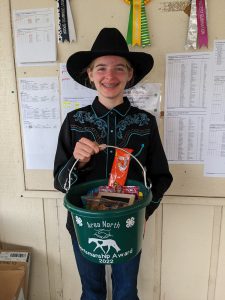
2022 Area North Horse Show Sportsmanship award winner.
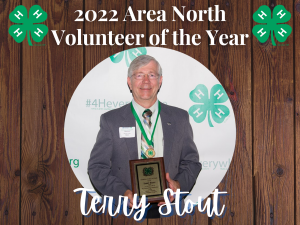
2022 Area North Volunteer of the Year.
In addition to the competition in the arena, youth and volunteers are recognized for their efforts outside the arena with various awards such as the sportsmanship and volunteer of the year awards. Horse projects and shows offer youth a chance to develop life skills, while loosing themselves in the magic of a horse. Horses demand responsibility, decision making, communication, among many other life skills. While some youth will be recognized for their success with ribbons, all of our youth are building skills that will carry them throughout their lifetimes. All of this though is not possible without the support and tireless effort put in by our volunteers. Thank you to all of our volunteers who made this even possible and congratulations to our 2022 volunteer of the year!
Congratulations to all the youth who competed and qualified for the State 4-H Horse Show later this year. To see a full list of qualifiers, click here. If you want to learn more about how you can get involved!
by Claire Davis | May 6, 2022
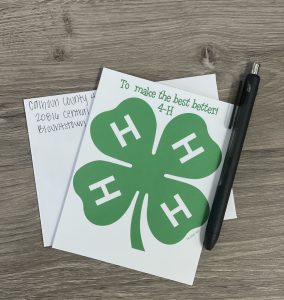 How do you know when it is appropriate to send a thank you card? Have you ever received a gift from someone? Did a volunteer donate their time for an event or for a club meeting? Are you in 4-H and someone purchased your project animal at auction? If you answered yes to any of these questions, then you should have written a thank you note to them! It does not just have to be a life changing event, such as a wedding, birthday, or baby shower, that warrants a thank you card. Whenever someone has done something nice for you, it is definitely worth sending them a thank you card.
How do you know when it is appropriate to send a thank you card? Have you ever received a gift from someone? Did a volunteer donate their time for an event or for a club meeting? Are you in 4-H and someone purchased your project animal at auction? If you answered yes to any of these questions, then you should have written a thank you note to them! It does not just have to be a life changing event, such as a wedding, birthday, or baby shower, that warrants a thank you card. Whenever someone has done something nice for you, it is definitely worth sending them a thank you card.
Writing thank you notes is a skill that many people should have, but many overlook. What exactly do you need to say in your thank you note? Here is an easy guide for a few things that you should include in your thank you note, regardless of the reason you are writing it!
Make sure that you start off by thinking of why you are writing a thank you note! Thank you notes let the individuals know that you care, that you are proud of your accomplishments, or make them feel appreciated for something that they have done for you!
-

A decorated academic cap at commencement. Photo taken 04-29-17.
Make the letter personal by starting with a salutation. Address the individual(s) by their name. If it is someone that you are well acquainted with, it is alright for you to address them by their first name. If it is someone that you are not as familiar with, stick to Mr., Mrs., Ms, and/or Miss last name. Below are a few examples of how to address someone:
Dear Aunt Renae,
Dear Lilly,
Dear Mr. and Mrs. Leonard,
- Get right to the point and express your gratitude. Some examples could be:
“Thank you so much for your generous wedding gift.”
“Thank you for the birthday present.”
“Thank you for donating your time at the Horse Club Meeting.”
“Thank you for purchasing my steer at the Calhoun County Livestock Show.”
- Maybe mention a specific detail or two. There is no need to exaggerate about their gift, but tell them what it might be used for or what you appreciate about it. Here are a few examples of things to say.
“I am so excited to get to use the birthday money on my upcoming trip to Disney World.”
“I’ve had my eye on a smoothie maker, and now I am a smoothie making machine!”
“We are saving the wedding money to help build our future home together.”
“The knowledge you shared at the meeting is incredibly valuable and the kids were soaking it up!”
“I am going to save the money from my 4-H steer project in my college fund.”
- Look ahead to the future. You may be excited about your trip to Disney World or the new smoothie machine, but make sure they know that you appreciate them or enjoyed working with them. If you are likely to spend time with them again in the future, this is a good way to move your letter towards wrapping up.***This suggestion may not apply to every letter.
“I can’t wait to have dinner with you again.”
“I’ll be up that way here in a few months and would love to see you.”
“I am interested in the position and look forward to hearing from you soon.”
“We cannot wait to have you teach us again at the club meeting next month.”
- Wrap it up with another thank you and sign off. Make sure that your letter is clear, you want to thank them for their time, donation, money, etc. You do not have to use fancy language to end your letter.
“Thank you again for thinking of us on our special day!”
“Thank you for being so generous to our organization.”
“Again, thank you for spending your time with us.”

Albert the Alligator Florida Gator mascot holding a thank you sign. Photo taken 11-16-16.
Make sure to end your letter appropriately, whether that be professionally or casually.
“Warmly,”
“With love,”
“Sincerely,”
When in doubt, write a thank you card. Your recipient will feel extra special that you want to show them your gratitude!




















